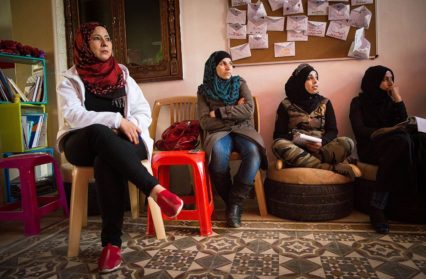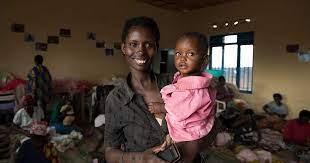As part of her residency, Siân Norris presents a new contribution to Wales Arts Review where she speaks to the non-profit charity Women for Refugee Women. Throughout 2017 these artists, including Siân Norris will take a leading creative role in what Wales Arts Review publishes, centring their skills on a challenging project over the course of a month. We were inundated with applications, receiving hundreds of emails about the positions, and it was no easy task whittling down all that talent to this final eleven. Our team of six editors debated long into the night, and in the end, we decided on a collection of people who we most want to work with, and whose work excites us. We think you will be excited by them too.
To support the non-profit charity Women for Refugee Women charity, click here.

In May this year, I visited the non-profit charity Women for Refugee Women. I spoke to the lesbian and bisexual women’s campaigner, Sarah Cope, about the issues affecting LGBT asylum seekers, and the wider issues experienced by women detained in Yarls Wood.
This conversation which explores the non-profit charity WfRW and the truth behind the care of refugees is reproduced with Sarah’s permission.
Siân Norris: What are some of the specific issues that gay women encounter when they come to the UK to claim asylum?
W4RW: I think a lot of lesbian and bisexual women who come seeking asylum have hidden their sexuality all their lives. It’s not like they arrive here and they’re suddenly getting a girlfriend and being open about their sexuality. For a lot of them, it may take a long time to be out.
I’ve just been visiting a woman in Yarls Wood. She’s a Roma woman and she’s a lesbian – she’s known since she was 15 that she was a lesbian. She had been forced into prostitution by family members, she has fled that and came to the UK. She ended up married to a man who she believes married her to get a visa with her being an EU citizen. She had two children, she’s been an addict, she’s been in prison, and only in Yarls Wood has she been able to start exploring her sexuality.
So quite often they’ve known about their sexuality for a long time but they’ve not really been able to act on it.
And then to have to prove it to the Home Office! And to talk to often a male, straight guy and a hostile one at that…
SN: This is an issue isn’t it as women are entitled to speak to a woman officer but they’re not told about this right.
W4RW: Absolutely and there’ll often be language difficulties or cultural differences. For example, you don’t talk about sex in many cultures. Particularly not gay sex. And you don’t open up to someone you don’t know – well none of us do. You just don’t do that! And to have to do that in a very official, austere, intimidating environment, where you are being questioned, again and again, to try and catch you out. They’re asking ‘where’s your evidence’. And they’re asking about things that aren’t culturally relevant to you.
SN: I think this is a really key point isn’t it, that the Home Office has this attitude that gay culture is Western Gay Culture.
W4RW: Yes. Absolutely. If you’re destitute you are probably not going to be going to a gay nightclub. And even if you aren’t destitute, you might not be going for cultural reasons. It’s very very hard for people to prove their sexuality. Under Labour 98% of gay asylum seekers were sent back to their country of origin. Apparently, it’s a bit less now but it’s not improved very much.

SN: I had no idea it was so high.
W4RW: It has got a little bit better in the last few years. But you see a lot of hypocrisy from the government. Like, hey we have same-sex marriage now but we’ll detain this lesbian in Yarls Wood for months or years. Or – oh FGM’s terrible but we’ll send this woman back who has escaped FGM and she’ll experience it when she gets back.
So you have one set of rules for the white British population and another set for people who aren’t that.
SN: I remember seeing William Hague being interviewed by Cathy Newman on Channel 4 News talking about rape as a weapon of war, which he was obviously very good on, and she pointed out that his government was detaining survivors of rape as a weapon of war in Yarls Wood. His response was ‘we have a very complicated asylum system’ – he wouldn’t face up to the fact that he wanted to help victims when they’re “over there” but as soon as the women are in the UK it’s not a concern.
W4RW: I do befriend work in Yarls Wood and about half the women I’ve worked with are lesbian or bisexual. And some of them are out but a lot of them don’t talk about it. I’ve been surprised at how out the woman I mentioned before is, especially as she’s experienced homophobia within Yarls Wood. And that’s a real issue you know, if you’re from Nigeria and you’re a lesbian and you go in there – most people are drawn to their country groups – but then there may be homophobia within that group because of the culture the women have come from. Women, therefore, find they can bond over their nationality but can’t talk about their sexuality.
SN: And of course that makes the whole burden of proof harder because the Home Office wants to know why you’re not out. I remember there was a case recently with a Nigerian woman who had children and that was used to “prove” she wasn’t gay. I mean, my mum’s a lesbian and I was like “oh so do I not exist then?”. As you say, if you’ve come from a culture where you’ve had to hide your sexuality and live a closeted life, where’s your proof? And also how do you evidence sexuality anyway?
W4RW: Absolutely. And it’s dangerous to do so should you then be disbelieved and sent back. Say you do your whole Facebook with pictures of you at Pride, or pictures of you and your girlfriend, and then they send you back – it’s out there! You’re sent back, what’s going to happen to you then? That happened to a woman we supported at Women for Refugee Women. She’d been in this country for years. She was openly bisexual and Movement for Justice did a lot of campaigning with her. She went to Yarls Wood for the second time last year and then she was deported back to Nigeria. And it’s all over the internet that she’s bisexual. That information had to be put out there to campaign for her case and she had to do it to ‘prove’ her sexuality. Now she’s back in Nigeria with all that information live on the internet for everyone to see, and you wonder what danger she is in.

SN: It’s hard to get your head around.
In terms of the process – when an asylum seeker arrives and gets taken to Yarls Wood, what’s the process then?
W4RW: It’s really complicated. I’d have to show you a flowchart! But basically, you can put in an asylum claim. They can agree on it on the first attempt, which is rare, or they can turn you down. Then you can appeal and have a judicial review of the whole case. You can put in a fresh claim with new evidence or on a different angle – so you might put one in about right to family life, and you might put one in about your sexuality. But then they might say ‘well you didn’t mention your sexuality earlier so it can’t be true.’
It can take over a decade. People’s lives are in flux, they can’t work, they’re destitute. A lot of people want to work. They might then end up working illegally, get caught in an immigration raid and sent to Yarls Wood.
Or they get sent to prison sometimes and have a criminal record. A lot of women go from prison to Yarls Wood which effectively lengthens their sentences by months if not years. I think this is a really interesting point regarding the legal system. There’s no judicial process overseeing detention which, if I were a judge, I’d be really angry about. Because you decide the sentence for this person and actually you haven’t got that power because someone can be held for so much longer.
I was visiting a woman with five children. She had been in a horrible violent relationship. The children were still with the father. She was going to be getting out of prison the next day, and then they sent her to Yarls Wood. She was detained for six months.
Her mother helped look after her kids, but often children get taken into the care of because their parents are in detention.
SN: Is that also because we no longer detain children, and yet now we are seeing families being split up?
W4RW: Yes. You really have to ask whether parents should be kept in detention – not just mothers but parents.
You see these little kids visiting and they’re frightened. It’s an intimidating place. It’s very much an institution. SERCO [SN note: the private company that runs Yarls Wood] like to go on about it as being like a hotel. No, it’s a prison. In fact, it’s worse than prison because in prison you know when you are getting out.
SN: One thing that stayed with me when I attended the Set Her Free protest in July 2015 was that the women couldn’t open the windows very far. That is a prison if you’re not allowing people to open their windows. That is a prison.

How do women end up in Yarls Wood?
W4RW: Some of them will have come out of prison and they’ll be trying to deport them. They may have been found working illegally and rather than going to prison they’ll be taken to a detention centre instead. It might be they’ve come to the end of their asylum claim. Sometimes you can’t even work out why they’re in there, to be honest.
The government has a deport first, appeal later policy. So women are deported to their country of origin where their life may be at risk and they’re probably going to be destitute. They can then appeal, technically. But are you really going to be able to get in touch with your solicitor back in the UK to try and arrange things with your Home Office caseworker? When you’re in fear for your life, with no money?
SN: I wanted to ask about the psychological impact of not knowing how long you’ll be detained.
W4RW: There’s a lot of campaigning to try and put a time limit on detention and both Labour and the Liberal Democrats put this in their manifesto. And it would be an important step if it was part of the process of ending detention. It’s the indefinite nature of detention that is the thing that drives people crazy.
I’ve kept in touch with a lot of the women I’ve befriended in Yarls Wood – two were deported but the rest were released. And it has long-lasting psychological effects. People waking up in the night from nightmares that they’re still in Yarls Wood. People finding it very hard to adapt to being out in the busy world again.
That place – it’s in the middle of nowhere, it’s isolated. And bizarrely you can be more isolated after you’ve been released. There is solidarity and sisterhood inside Yarls Wood. You make friends with people and that solidarity is amazing. I once heard this massive noise to the point where I thought there was a riot inside. And it turned out someone was being released and they were cheering.
People support each other. They really support each other.
But when you leave, especially if you’ve been detained for years, you can really struggle because you don’t have those women around you anymore.
When someone is released from prison there are efforts to reacclimatise them to the world. There’s none of that in detention. You can literally be told ‘pack your bags, you’re being released.’ You can’t plan where you’re going. They’ll drop you off at the station holding a slip of paper which tells you where you need to get your train to.
There was a woman who was so in shock when she was taken to Bedford Station, she was on the phone and fainted onto the train track.
SN: It’s this dereliction of care.
W4RW: Absolutely. For a lot of the women – they get to the station and it’s the first time they’ve seen where they are. A lot of them are brought in in the middle of the night and unless they go to the hospital they are in Yarls Wood and that’s it.
SN: It’s hard to imagine the reality of detention. That you’re in this space for months, years, and unless you need to go to the hospital you have no idea of your surroundings.
W4RW: I can’t imagine how you’d survive that. And then have to go out into the world. Particularly if you already have post-traumatic stress disorder.
SN: And that’s the massive thing, right? The big issue around detention: you are detaining women that are very damaged. You might have been raped, in a warzone, in prison, and then you are put in a prison with no idea about how long you’ll be in there. If you’ll be released in the UK or sent back to the country you’ve fled.
W4RW: Exactly.
SN: Thank you so much for talking to me.
This contribution by Siân Norris is part of the Artists in Residence series.
Women for Refugee Women is a non-profit charity that strives to empower, influence and offer change.










